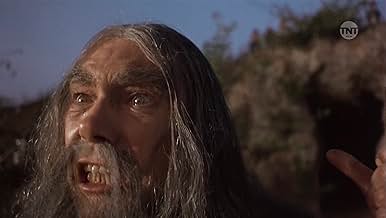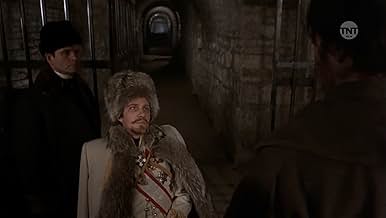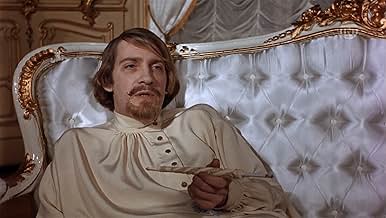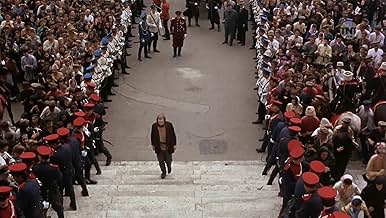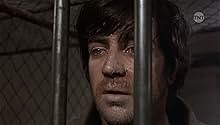CALIFICACIÓN DE IMDb
6.8/10
1.5 k
TU CALIFICACIÓN
Agrega una trama en tu idiomaIn Czarist Russia, around 1911, a Russian-Jewish handyman, Yakov Bok (Sir Alan Bates), is wrongly imprisoned for a most unlikely crime.In Czarist Russia, around 1911, a Russian-Jewish handyman, Yakov Bok (Sir Alan Bates), is wrongly imprisoned for a most unlikely crime.In Czarist Russia, around 1911, a Russian-Jewish handyman, Yakov Bok (Sir Alan Bates), is wrongly imprisoned for a most unlikely crime.
- Dirección
- Guionistas
- Elenco
- Nominado a 1 premio Óscar
- 8 nominaciones en total
- Dirección
- Guionistas
- Todo el elenco y el equipo
- Producción, taquilla y más en IMDbPro
Opiniones destacadas
This was Frankenheimer's second big color movie (after Grand Prix in 1966). Alan Bates was nominated for the Academy Award for his portrayal of Yakov Bok, and his performance was certainly Oscar worthy. The movie is based on Bernard Malamud's 1966 Pulitzer Prize winning novel.
---------------------------------------------------------------------
"Bernard Malamud based The Fixer on the case of Mendel Beilis, a Jewish bookkeeper for a brick factory who was accused of ritualistically murdering a Christian child. With very little evidence against him, the Russian government pushed for the conviction of Beilis in order to justify anti-Semitic policies that were being enacted at the time. The novel's protagonist, Yakov Bok, also works in a brick factory, and he is charged, for no particular reason except being Jewish, for a crime just like the one with which Beilis was charged. As in Malamud's fictionalized version, the actual case occurred between 1911 and 1913 in the Ukrainian capital, Kiev. The Beilis case is credited with being one of the main contributing factors in bringing about the Russian Revolution by raising the sense of distrust Russian citizens felt toward their government and the anger of people around the world. The political situation surrounding the case is hardly touched upon in The Fixer. Most of the book focuses on Yakov's life in solitary confinement, waiting for years in prison for the murder charge to be formally levied against him so that he can get on with the trial.
The Fixer was published in 1966, more than fifty years after the Beilis case had been settled in court, but Malamud could count on his audience to be familiar with the circumstances of what had happened because the case was and is an important event in the history of the Jewish struggle for peace and security. The book won the National Book Award and the Pulitzer Prize, and is considered one of the finest in the canon of books by one of America's finest authors." – Quoted from encyclopedia.com
--------------------------------------------------
The movie follows the odyssey of Yakov Bok (Alan Bates)—'a fixer' or handyman--as he leaves his small pre-Revolutionary Ukrainian town to travel to the city of Kiev. Although he has no strong religious or political feelings and never had thought that he could only be defined by one word--'Jew'--he lives in the ghetto. When a tailor in the ghetto suggests that he could make more money by passing as a Christian in the city, he tries. After saving a Christian, Lebedev (Hugh Griffith), in the street, he is taken in to Levedev's house and given work. Lebedev's crippled daughter, Zinaida (Elizabeth Hartman), seduces him and he willingly follows her. But, when he finds that she is 'unclean (having her period), he turns her down and leaves.
But, events change his life when he is accused of killing a young Christian boy in a 'Jewish ritual murder. Once imprisoned, almost everyone inside and outside of the prison hates him. Even though he is befriended by a defender, Bibikov (Dirk Bogarde), he is relentlessly tortured and badgered by his prosecutor, Grubeshov (Ian Holm).
During Bok's imprisonment, the case against him is built on a series of unproven accusations. The murdered boy's mother testifies that she witnessed Bok killing her son. Zinaida testifies against him (based on her previous embarrassment of having seduced him and then been turned down). However, as a Jew, he is never given the benefit of a public trial. His crime rests on the fact that he IS a Jew; that he reads Spinoza; and that he demands—and is refused--a trial for simple human decency. As his imprisonment and torture is extended he continues to grow more determined. When all attempts fail to get him to confess to the murder, a representative of the Czar offers him a pardon. But, he refuses the pardon since he has committed no crime. His determination to fight for a public trail continues until the very end.
Although this film is very good, it doesn't hold up as well as Frankenheimer's black and white movies from the 1960s. As the saying goes, 'the book is better than the movie,' Still, Bates acting is laudable and should be seen if possible.
---------------------------------------------------------------------
"Bernard Malamud based The Fixer on the case of Mendel Beilis, a Jewish bookkeeper for a brick factory who was accused of ritualistically murdering a Christian child. With very little evidence against him, the Russian government pushed for the conviction of Beilis in order to justify anti-Semitic policies that were being enacted at the time. The novel's protagonist, Yakov Bok, also works in a brick factory, and he is charged, for no particular reason except being Jewish, for a crime just like the one with which Beilis was charged. As in Malamud's fictionalized version, the actual case occurred between 1911 and 1913 in the Ukrainian capital, Kiev. The Beilis case is credited with being one of the main contributing factors in bringing about the Russian Revolution by raising the sense of distrust Russian citizens felt toward their government and the anger of people around the world. The political situation surrounding the case is hardly touched upon in The Fixer. Most of the book focuses on Yakov's life in solitary confinement, waiting for years in prison for the murder charge to be formally levied against him so that he can get on with the trial.
The Fixer was published in 1966, more than fifty years after the Beilis case had been settled in court, but Malamud could count on his audience to be familiar with the circumstances of what had happened because the case was and is an important event in the history of the Jewish struggle for peace and security. The book won the National Book Award and the Pulitzer Prize, and is considered one of the finest in the canon of books by one of America's finest authors." – Quoted from encyclopedia.com
--------------------------------------------------
The movie follows the odyssey of Yakov Bok (Alan Bates)—'a fixer' or handyman--as he leaves his small pre-Revolutionary Ukrainian town to travel to the city of Kiev. Although he has no strong religious or political feelings and never had thought that he could only be defined by one word--'Jew'--he lives in the ghetto. When a tailor in the ghetto suggests that he could make more money by passing as a Christian in the city, he tries. After saving a Christian, Lebedev (Hugh Griffith), in the street, he is taken in to Levedev's house and given work. Lebedev's crippled daughter, Zinaida (Elizabeth Hartman), seduces him and he willingly follows her. But, when he finds that she is 'unclean (having her period), he turns her down and leaves.
But, events change his life when he is accused of killing a young Christian boy in a 'Jewish ritual murder. Once imprisoned, almost everyone inside and outside of the prison hates him. Even though he is befriended by a defender, Bibikov (Dirk Bogarde), he is relentlessly tortured and badgered by his prosecutor, Grubeshov (Ian Holm).
During Bok's imprisonment, the case against him is built on a series of unproven accusations. The murdered boy's mother testifies that she witnessed Bok killing her son. Zinaida testifies against him (based on her previous embarrassment of having seduced him and then been turned down). However, as a Jew, he is never given the benefit of a public trial. His crime rests on the fact that he IS a Jew; that he reads Spinoza; and that he demands—and is refused--a trial for simple human decency. As his imprisonment and torture is extended he continues to grow more determined. When all attempts fail to get him to confess to the murder, a representative of the Czar offers him a pardon. But, he refuses the pardon since he has committed no crime. His determination to fight for a public trail continues until the very end.
Although this film is very good, it doesn't hold up as well as Frankenheimer's black and white movies from the 1960s. As the saying goes, 'the book is better than the movie,' Still, Bates acting is laudable and should be seen if possible.
An interesting picture. The portrait of a friendly, non-political Jew captured and accused for ridiculous crimes he did not, and for religious reasons, could not commit. It leaves you with a feeling of anger because of the inhumanity of men towards men. Enjoy!
10Levi-65
In 1969 while in Basic Training at Fort ORD, California our Company viewed this movie. Being 1969 and all that was happening at that time and as basic trainees, in an infantry company, 18 to 21 years of age, most destined for Vietnam, most had few things in our minds beyond our survival in the months to come. The strength, determination and courage in the face of oppression, constant disappointment and the insurmountable odds of survival unified all 120+ of us to a standing ovation of applause and cheering at the end. We all came from such different backgrounds, Watts, Oklahoma, East LA, Salt Lake City, Montana and Chicago. We were all of different ethnic backgrounds, Hispanic, Black, Irish, Catholic etc. None of us knew of Jewish life in Tzarist Russian. All felt a bond with "The Fixer", a victim of times, prejudice and "The System".
For many of us, the move, "The Fixer" did more than just occupy an afternoon away from military training. It connected us with a spirit, a humanness to deal with and hopefully survive adversity. To this day the other message I carry is that every act we do is a political statement. Even the act of being, "Apolitical" is a statement of politics.
A Great & Poignant Movie that should be included in everyones film experiences!
For many of us, the move, "The Fixer" did more than just occupy an afternoon away from military training. It connected us with a spirit, a humanness to deal with and hopefully survive adversity. To this day the other message I carry is that every act we do is a political statement. Even the act of being, "Apolitical" is a statement of politics.
A Great & Poignant Movie that should be included in everyones film experiences!
When is John Frankenheimer going to get the recognition he deserves as a true original film artist? A number of his films are either barely released or completely unreleased (99 and 44/100% Dead, The Challenge, The Fourth War).
Many of Frankenheimer's films dealt with the fight for social justice and human compassion and The Fixer definitely falls into this category. Alan Bates is terrific as a Russian Jew who "passes" for Gentile and decides to work for an anti-Semite for money. He's later accused by the authorities of a child murder he did not commit and must endure endless torture by the Czarist Russians to keep from confessing. Frankenheimer's experience, directing many plays for Golden Age of Television shows like Playhouse 90, demonstrates perfectly that he can master effective facial close-ups and enhance the great dialogue. So few American films can be brave enough to actually talk about ideas without having to always resort to action to appease those out there with short attention spans. Well, Frankenheimer can deliver the action goods (note Ronin and The Train), but give him credit for embracing the influence of great foreign films' sense of introspection. The claustrophobic atmosphere of the prison is so immense that the final scene is one of the most exhilarating I've felt in quite a while. Credit Trumbo also with creating a hero who is not totally perfect by any means. Yakov Bok had not only betrayed his heritage by working for anti-Semites, but also, as we learn later, is out of touch with relating to his family. Dirk Bogarde is also quite good as Bok's defense counsel as is a young Ian Holm as a sadistic Russian official.
Many of Frankenheimer's films dealt with the fight for social justice and human compassion and The Fixer definitely falls into this category. Alan Bates is terrific as a Russian Jew who "passes" for Gentile and decides to work for an anti-Semite for money. He's later accused by the authorities of a child murder he did not commit and must endure endless torture by the Czarist Russians to keep from confessing. Frankenheimer's experience, directing many plays for Golden Age of Television shows like Playhouse 90, demonstrates perfectly that he can master effective facial close-ups and enhance the great dialogue. So few American films can be brave enough to actually talk about ideas without having to always resort to action to appease those out there with short attention spans. Well, Frankenheimer can deliver the action goods (note Ronin and The Train), but give him credit for embracing the influence of great foreign films' sense of introspection. The claustrophobic atmosphere of the prison is so immense that the final scene is one of the most exhilarating I've felt in quite a while. Credit Trumbo also with creating a hero who is not totally perfect by any means. Yakov Bok had not only betrayed his heritage by working for anti-Semites, but also, as we learn later, is out of touch with relating to his family. Dirk Bogarde is also quite good as Bok's defense counsel as is a young Ian Holm as a sadistic Russian official.
10wonga66
A real Oscar winning performance by Bates.Beats me why he didn't get it!The whole story portrays the times in Russia so well with anti- semitisem as a way to keep away attention from the failings of the Csar and his evil government. A unique actor who really feels his part as can be told by Bates eyes which reflect that his soul is part of what he his doing unlike todays mimik actors.
¿Sabías que…?
- TriviaThis movie was made in Hungary, then a Communist country. The cast and crew were obliged to work six days a week under considerable pressure, and director John Frankenheimer was very unpopular. Sir Dirk Bogarde always referred to him thereafter as "Frankenstein", while Sir Ian Holm reported in his memoirs nearly forty years later, that Frankenheimer had, during filming, a very obvious extra-marital affair with the daughter of screenwriter Dalton Trumbo, even though his wife, Evans Evans, was in attendance.
- ConexionesFeatured in Hollywoodism: Jews, Movies and the American Dream (1998)
Selecciones populares
Inicia sesión para calificar y agrega a la lista de videos para obtener recomendaciones personalizadas
- How long is The Fixer?Con tecnología de Alexa
Detalles
- Tiempo de ejecución2 horas 12 minutos
- Mezcla de sonido
- Relación de aspecto
- 1.85 : 1
Contribuir a esta página
Sugiere una edición o agrega el contenido que falta

Principales brechas de datos
By what name was The Fixer (1968) officially released in India in English?
Responda
